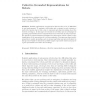564 search results - page 34 / 113 » Knowledge Representation with Autonomic Ontologies |
ECTEL
2008
Springer
13 years 9 months ago
2008
Springer
Modeling the cognitive processes of learners is fundamental to build educational software that are autonomous and that can provide highly tailored assistance during learning [3]. F...
ICVS
2009
Springer
14 years 2 months ago
2009
Springer
Abstract. We describe a system for autonomous learning of visual object representations and their grasp affordances on a robot-vision system. It segments objects by grasping and mo...
EXPERT
2006
13 years 7 months ago
2006
We argue that artificial intelligence systems must be able to manipulate their own internal representations automatically in order to deal with an infinitely complex and ever chan...
BMCBI
2008
13 years 7 months ago
2008
Background: Bio-ontologies are key elements of knowledge management in bioinformatics. Rich and rigorous bio-ontologies should represent biological knowledge with high fidelity an...
DARS
2000
Springer
14 years 1 days ago
2000
Springer
Realistic applications of autonomous Robotics face a lot of difficulties in real environments. To navigate, self-localize and cooperate in such contexts, a multi-robot system has t...

